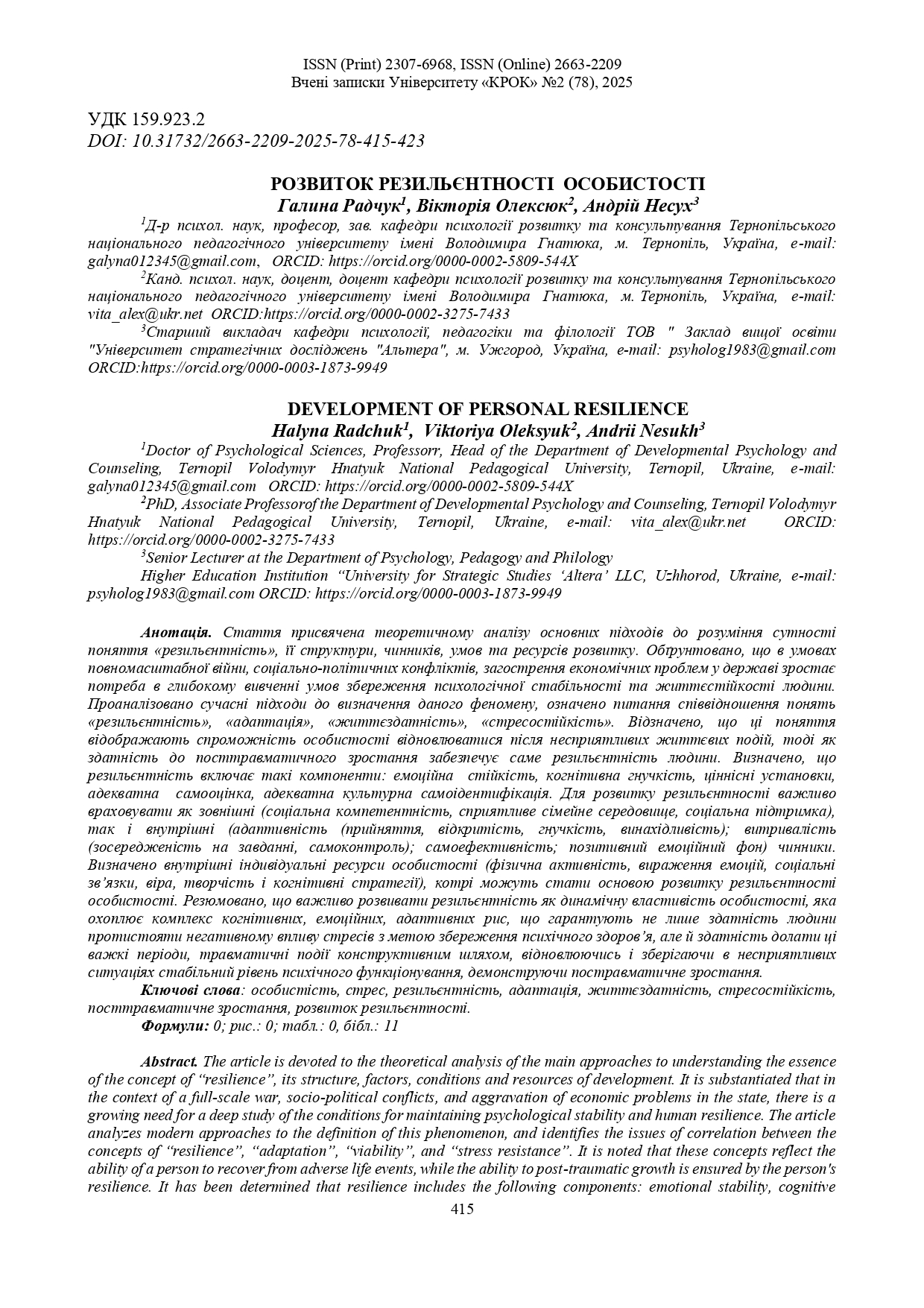DEVELOPMENT OF PERSONAL RESILIENCE
DOI:
https://doi.org/10.31732/2663-2209-2025-78-415-423Keywords:
personality, stress, resilience, adaptation, viability, stress resistance, post-traumatic growth, development of resilienceAbstract
The article is devoted to the theoretical analysis of the main approaches to understanding the essence of the concept of “resilience”, its structure, factors, conditions and resources of development. It is substantiated that in the context of a full-scale war, socio-political conflicts, and aggravation of economic problems in the state, there is a growing need for a deep study of the conditions for maintaining psychological stability and human resilience. The article analyzes modern approaches to the definition of this phenomenon, and identifies the issues of correlation between the concepts of “resilience”, “adaptation”, “viability”, and “stress resistance”. It is noted that these concepts reflect the ability of a person to recover from adverse life events, while the ability to post-traumatic growth is ensured by the person's resilience. It has been determined that resilience includes the following components: emotional stability, cognitive flexibility, values, adequate self-esteem, and adequate cultural self-identification. In order to develop resilience, it is important to take into account both external (social competence, favorable family environment, social support) and internal (adaptability (acceptance, openness, flexibility, resourcefulness); endurance (focus on the task, self-control); self-efficacy; positive emotional background) factors. The internal individual resources of the personality (physical activity, expression of emotions, social ties, faith, creativity and cognitive strategies) are identified, which can become the basis for the development of personality resilience. It is summarized that it is important to develop resilience as a dynamic property of personality, which covers a set of cognitive, emotional, adaptive traits that guarantee not only the ability of a person to withstand the negative effects of stress in order to maintain mental health, but also the ability to overcome these difficult periods, traumatic events in a constructive way, recovering and maintaining a stable level of mental functioning in adverse situations, demonstrating post-traumatic growth.
Downloads
References
Адаменко, Л. С. (2021). Актуальні підходи до проблеми дослідження психічної резильєнтності. Вісник Національного університету оборони України, 58(5), 5–13.
Грішин, Е. (2021). Резильєнтність особистості: сутність феномену, психодіагностика та засоби розвитку. Вісник ХНПУ імені Г. С. Сковороди "Психологія", 64, 62–81.
Давиденко, О. В., & Сингаївська, І. В. (2022). Визначення феномену резильєнтності. Держава, регіони, підприємництво: інформаційні, суспільно-правові, соціально-економічні аспекти розвитку: тези доповідей ІV Міжнародної конференції (Київ, 07 грудня 2022 р.). К.: Університет "КРОК", 402–405.
Лазос, Г. П. (2018). Резильєнтність: концептуалізація понять, огляд сучасних досліджень. Актуальні проблеми психології. Том 3 : Консультативна психологія і психотерапія, 14, 26–64.
Психосоціальна підтримка в умовах надзвичайних ситуацій: підхід резилієнс : навч.-метод. посіб. (2017). [Н. Гусак, В. Чернобровкіна, В. Чернобровкін, А. Максименко, С. Богданов, О. Бойко ; за заг. ред. Н. Гусак]; Нац. ун-т «Києво-Могилянська академія». Київ : НаУКМА, 92 с.
Радчук, Г. К. (2023). Психологічна підтримка педагогів під час війни. Воєнні конфлікти та техногенні катастрофи: історичні та психологічні наслідки: Збірник тез ІІІ Міжнародної наукової конференції, 20-21 квітня 2023 р. Упоряд. Криськов А. А., Габрусєва Н. В. Тернопіль: ФОП Паляниця В. А., 30–32. URL: https://elartu.tntu.edu.ua/bitstream/lib/41066/2/MCTD_2023_Radchuk_H-Psychological_support_of_30-32.pdf (дата звернення 23. 04. 2025 р.).
Титаренко, Т. М. (2009). Життєстійкість особистості: соціальна необхідність та безпека: навч. посіб. Київ: Марич, 105 с.
Хамініч, О. М. (2016). Резільєнтність: життєстійкість, життєздатність або резільєнтність. Науковий вісник Херсонського державного університету. Серія “Психологічні науки”, 6(2), 160–165.
Bernard, M. (2004). Emotional resilience in children: Implications for Rational EmotiveEducation. Romanian Journal of Cognitive and Behavioral Psychotherapies, 4, 39–52.
Lahad, M., & Leykin, D. (2013). The Integrative Model of Resiliency –The «BASIC Ph» Model, or What Do We Know about Survival? The «BASIC Ph» Model of Coping and Resiliency Theory, Research and Cross-Cultural. London, UK and Philadelphia, USA: Jessica Kingsley. 11–32.
Neenan, M. (2009). Developing resilience: a cognitive behavioral approach. Kent, 2009. 224 p.

Downloads
Published
How to Cite
Issue
Section
License

This work is licensed under a Creative Commons Attribution-NonCommercial 4.0 International License.

